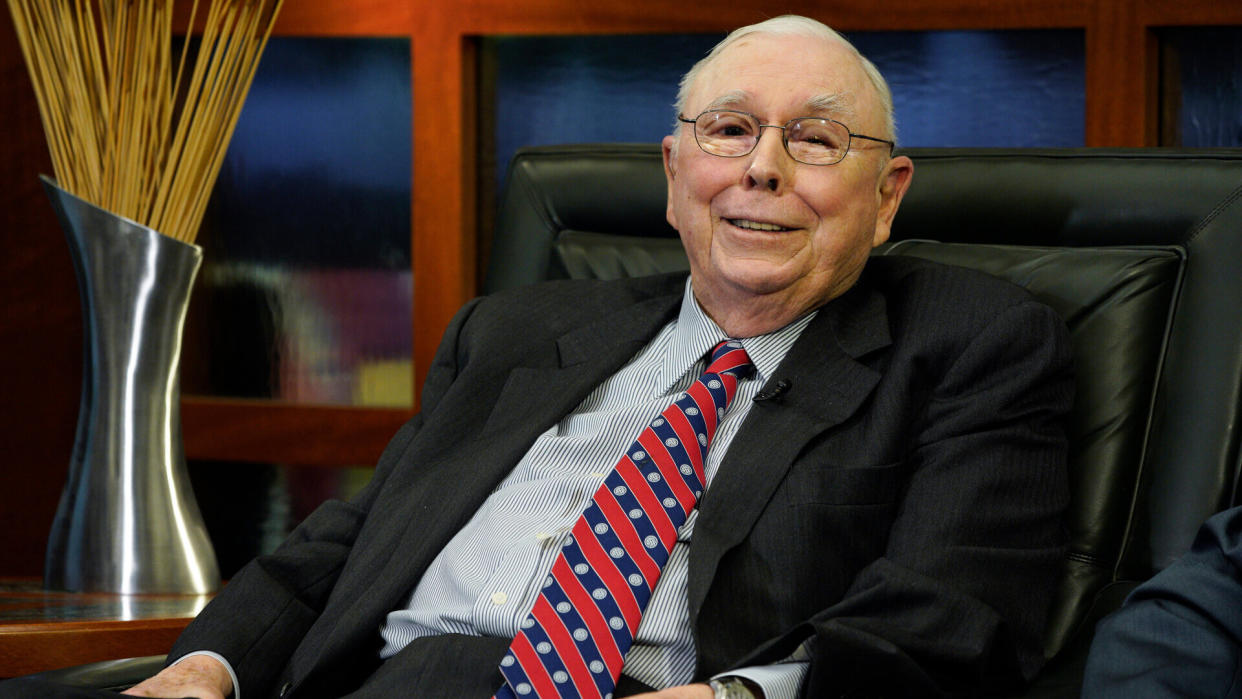Charlie Munger: A Look at the Fortune and Legacy of Warren Buffett’s Right-hand Man

American businessman and investor Charles (Charlie) Munger, best-known as Warren Buffett’s business partner and vice-chairman of holding company Berkshire Hathaway, died on Nov. 28, 2023, at the age of 99. He was less than two months shy of 100 years old.
See: 12 Unrecognizable Signs of Wealth
Warren Buffett’s Financial Plan to Tackle America’s Debt: ‘I Can End the Deficit in 5 Minutes’
Last year, Munger announced a partial retirement at age 98. He maintained his role with Berkshire Hathaway, as Buffett’s right-hand man, but stepped down from his position as chairman of Daily Journal Corp., a newspaper publisher and software provider. Munger had served the company in that position since 1977.
With a net worth of $2.6 billion, according to the latest Forbes Billionaires’ list, Munger ranked 1,182nd on the list when he died. As of 1996, Munger owned 18,829 Class A shares of Berkshire Hathaway, according to Business Insider, representing roughly 1.6% of the company’s stock.
Meanwhile, Buffett owned a much larger stake. Munger had sold or donated more than 75% of his Berkshire Hathaway shares over the years. “I’m deliberately taking my net worth down,” he told The Omaha World-Herald in 2013. “My thinking is, I’m not immortal,” he continued, “… and I won’t need it where I’m going.” In October of this year, Munger had reduced his position to 4,033 Class A shares.
Munger: The Early Years
Born in 1924 in Omaha, Nebraska, Munger grew up living close to his eventual business partner Warren Buffett. They both worked at Buffett’s grandfather’s grocery store as teenagers — although not at the same time — learning discipline, customer service, and business savvy, CNBC reported. The boys earned roughly 20 cents an hour during the Great Depression, Reuters reported in a press release announcing Munger’s death.
After high school, Munger attended the University of Michigan. He dropped out in 1943 and enlisted in the Army Air Corps. The Army sent him to CalTech to learn meteorology, then stationed him in Alaska, though he never saw combat.
Using the GI Bill, Munger tried out several universities before attending Harvard Law School. Having never received an undergraduate degree, he got in based on a recommendation from a family friend. Munger earned his Juris Doctor Magna Cum Laude in 1948.
Warren Buffett’s Advice to Investors: ‘Incredible Period’ for America’s Economy is Ending
How Did Munger Amass His Wealth?
In 1949, with his wife and children, Munger moved to California to work for the law firm Wright & Garrett, later founding his own firm. He continued practicing law until he was 41. At that time, he chose to work full-time as an investor.
Delving into real estate development and investment management, Munger founded his own company in 1962 with a trader on the Pacific Coast Stock Exchange, Jack Wheeler. The highly successful investment firm yielded 19% average annual returns, according to Celebrity Net Worth.
When Munger returned to Omaha for his father’s funeral in 1959, he was reunited with childhood friend, Buffett. The two remained friends over the years, frequently discussing investment strategies. After closing his own firm in 1976, Munger joined Buffett’s investment firm Berkshire Hathaway as vice chairman in 1978, a position he held until his death.
In 2020, according to Salary.com, Munger earned a base pay of $100,000 at Berkshire Hathaway.
Munger on Why He Didn’t Take a Salary
In 2017, Munger said in an interview with Yahoo News: “I wish our example spread more. Because I think if you’re wealthy and own a share of a company and you get to decide what it does and whether it liquidates or whether it keeps going, that’s a nice position to be in… Maybe you shouldn’t try to grab all the money in addition. And that’s my theory on executive compensation.”
He added that many entrepreneurs throughout history, including Andrew Carnegie and Cornelius Vanderbilt, also did not draw salaries. Instead, they lived on investments and dividends from the company.
His Real Estate and Philanthropy
The same was true for Munger, who first earned millions in real estate investing, including the development of an upscale, 22-acre oceanfront community in Montecito. Homes there sell for roughly $10 million to $20 million, according to Celebrity Net Worth, with homeowners’ association (HOA) fees of $2,700.
Munger was also recognized as a philanthropist. Some of his favorite donation recipients included institutions of higher education, such as the University of Michigan, Stanford University, Pasadena’s Polytechnic School and the University of California at Santa Barbara.
More From GOBankingRates
This article originally appeared on GOBankingRates.com: Charlie Munger: A Look at the Fortune and Legacy of Warren Buffett’s Right-hand Man
